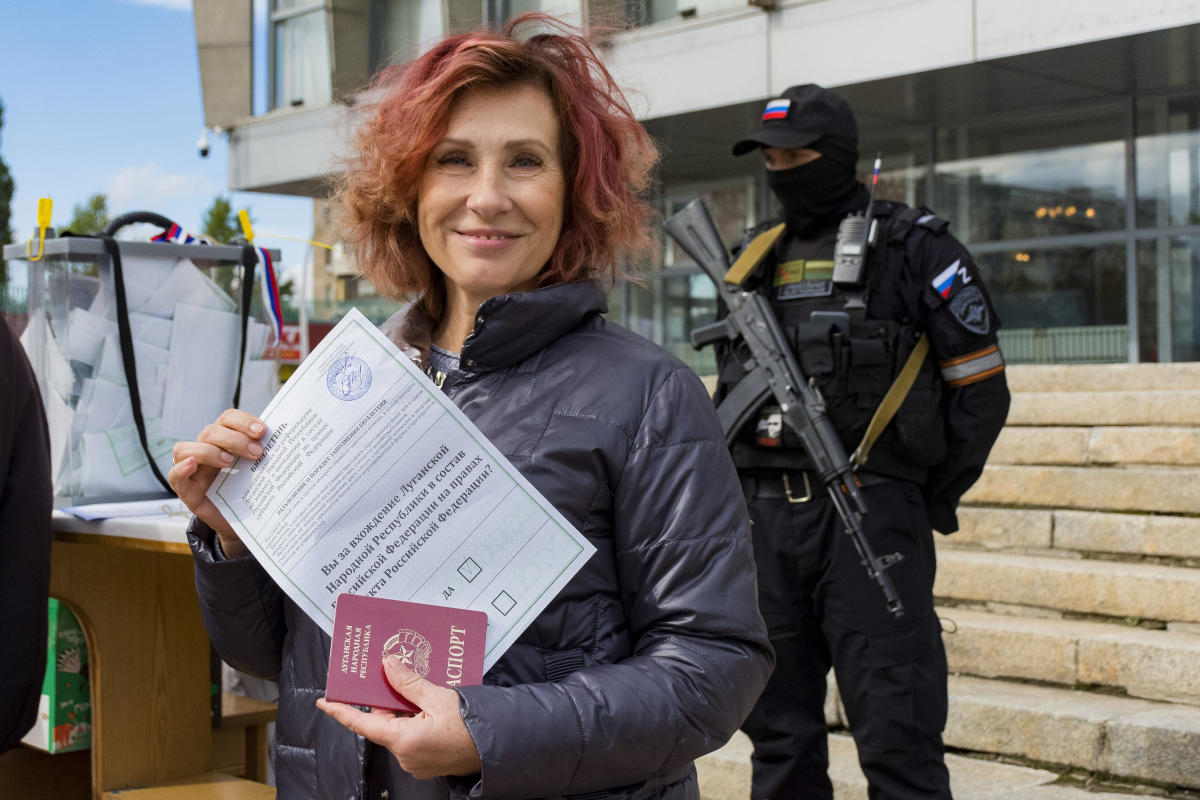KYIV, Ukraine (AP) – After seven weary months of war, many Ukrainians fear more suffering and political repression await them as referendums organized by the Kremlin with the help of armed police predict the imminent annexation of four occupied regions by Russia .
Many residents fled the regions before the referendums started, fearing being forced to vote or possibly being conscripted into the Russian military.
Petro Kobernik, who left the Russian-occupied southern city of Kherson just before Friday’s pre-determined vote, said the prospect of living under Russian law and the escalating war made him and others extremely nervous about the future.
“The situation is changing rapidly and people are afraid that they will be injured by the Russian army or by Ukrainian guerrillas and advancing Ukrainian troops,” Kobernik, 31, said in a telephone interview.
While some Russian officials accompanied by armed police carried ballots to neighborhoods, Kobernik said his 70-year-old father closed the door of his private home in the village of Novotroitske — part of Kherson — and vowed not to let anyone in.
The referendums, which Kiev and its Western allies have labeled as fake, are taking place in the Russian-controlled regions of Luhansk and Kherson, and in the occupied regions of Donetsk and Zaporizhzhya. They are widely seen as a pretext for annexation, and Russian authorities are expected to announce the regions as theirs once the vote ends on Tuesday.
The Kremlin has used this tactic before. In 2014, it held a hastily convened referendum in Ukraine’s Crimea region to justify annexation of the Black Sea peninsula, a move deemed illegal by most of the world.
Ukrainian authorities have told residents of the four Russian-occupied regions that they will face criminal penalties if they vote and have advised them to leave.
Russian President Vladimir Putin, who started mobilizing more troops for the war last week, said he is ready to use nuclear weapons to protect territory in a clear threat to Ukraine to halt its attempts to reclaim the regions. .
Putin’s escalating rhetoric and politically risky decision to call up as many as 300,000 army reservists come after the Russians were hastily forced to withdraw from much of northeastern Ukraine earlier this month. A fierce Ukrainian counter-offensive continues in the east and south of the country.
Moscow-appointed governor of the southern Kherson region, Vladimir Saldo, promised that Ukrainian attempts to derail the referendum by shelling the city will fail.
“It’s complicated because of security concerns, but every effort will be made to make the vote safe for voters and election officials,” Saldo said in a video address. “People are waiting to join Russia and want it to happen as soon as possible.”
Moscow-backed separatists in the eastern regions of Donetsk and Luhansk claim that most residents of these areas have dreamed of joining Russia since Russia’s annexation of Crimea.
But many residents there tell a different story.
“The streets are empty because people are staying at home,” Marina Irkho, a 38-year-old resident of the port city of Berdyansk on the Sea of Azov, said by phone. “No one wants them to declare us Russia and start arresting our men.”
She said “those who actively stood for Ukraine have left or gone into hiding,” adding that many of the older people who supported Russia have stayed but are afraid.
Ukrainian guerrillas have continuously targeted Moscow-appointed officials in the occupied territories.
Just a week before the referendum, a deputy head of Berdyansk’s city administration and his wife, who headed the city’s electoral commission, were killed in an attack.
Members of the Yellow Band guerrilla group, named after Ukraine’s yellow-and-blue national flag, have distributed pamphlets threatening those who cast their votes and urging residents to send photos and videos of people voting to support them. to be traced later.
The guerrillas also posted phone numbers of election commission heads in the Kherson region and called on pro-Ukraine activists to “make their lives unbearable”.
Ukrainian officials say there are signs of the illegality of the referendums everywhere.
“The Russians see the fear and unwillingness of the citizens to vote, so they are forced to take people in,” said Ivan Fedorov, the Ukrainian mayor of the Russian-occupied city of Melitopol, who was detained and held by the Russians before he left. the city.
“Groups of employees and Russians accompanied by armed troops move from one apartment to another, but few people open the doors,” Fedorov said. “The haste with which they organized that pseudo-referendum shows that they weren’t even serious about counting the ballots.”
Larysa Vinohradova, a resident of the port city of Mariupol who left the city after the Russian invasion, said many of her friends stayed because they had to take care of elderly parents who refused to flee. “They don’t stand for Russia, they want Mariupol to become part of Ukraine, and they are waiting for it,” she said, bursting into tears.
Luhansk Governor Serhiy Haidai, who left the region after Russian forces defeated the region, said residents fear the Russians will detain more men in the region for military service following Putin’s mobilization order.
“The Russians are using this pseudo-referendum as a pretext for armed people to visit apartments and search for remaining men to mobilize them and also look for anything suspicious and pro-Ukrainian,” Haidai told The Associated Press.
“The rapid Ukrainian counter-offensive has scared the Russians,” he added.
Analysts say Putin hopes to use the threat of military escalation to force Ukrainian President Volodymyr Zelenskyy into negotiations with the Kremlin.
“The haste with which the referendum was declared shows the Kremlin’s weakness, not its strength,” said Volodymyr Fesenko, head of the Penta Center, an independent think tank in Kiev. “The Kremlin is struggling to find levers to influence the situation that has spiraled out of control.”
____
Karmanau reported from Tallinn, Estonia.
____
Follow the AP’s coverage of the war at https://apnews.com/hub/russia-ukraine

